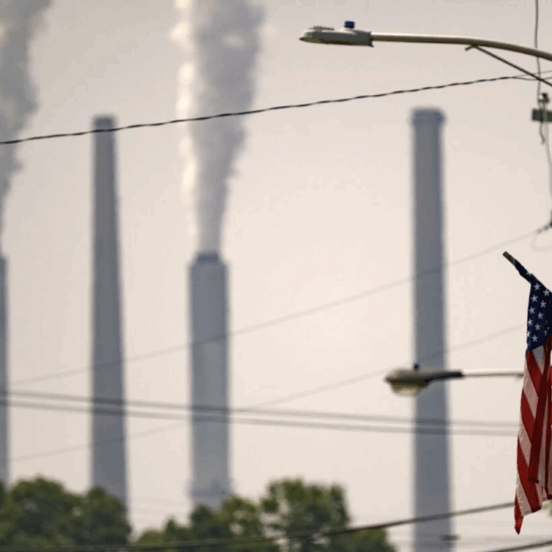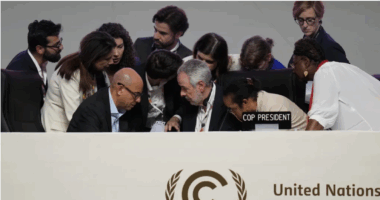Climate, Health and Equity Brief
Polluters on offense, planet on defense
September 29, 2025

The Climate, Health & Equity Brief is GMMB’s take on the latest news on the current impacts of climate change. If you haven’t subscribed yet, you can do so by clicking here.
Hot Topic: Erasing accountability. In a year already marked by new lows in Donald Trump’s effort to dismantle climate action, the administration has taken some of its most extreme steps yet. This month, the EPA formally proposed eliminating the Greenhouse Gas Reporting Program—the nation’s only consistent public record of emissions from more than 8,000 industrial facilities—a move that would blind policymakers and the public to rising pollution in order to cut compliance costs for big polluters.
At the same time, the Justice Department is in court seeking to strike down “polluter pays” laws in New York and Vermont, which would require fossil fuel giants to help fund climate adaptation and disaster recovery. And in Congress, industry allies are pushing a federal shield law to protect oil and gas companies from future climate lawsuits, potentially stripping states and communities of one of their few remaining tools to hold polluters accountable.
These assaults come just as a wave of new reports underscores the planetary harms of fossil fuel pollution. Scientists warn that ocean acidity has risen 30–40% since the industrial era, pushing marine ecosystems beyond safe limits and breaching the seventh of nine planetary boundaries that define humanity’s “safe operating space.” Record-breaking ocean heat has already reduced the seas’ ability to absorb planet-warming carbon dioxide, while land ecosystems are in parallel crisis: a new report finds that 60% of Earth’s landscapes can no longer maintain stability.
While President Trump declared to the United Nations this week that climate change is “the greatest con job ever perpetrated on the world,” the National Academies of Sciences, Engineering, and Medicine rebuffed that view, noting in a new report that it is “beyond scientific dispute” that greenhouse gases are heating the planet, and every ton emitted makes the impacts more severe.
In good news, action continues outside of official Washington. China has set its first-ever absolute climate target, pledging that by 2035, non-fossil energy sources will supply more than 30% of its energy mix and that national emissions will fall 7–10% below their peak levels—a step in the right direction, if more modest than observers say is necessary.
And in a timely counterpoint to proposed federal rollbacks, nonprofit Climate TRACE has launched a public tool that uses satellite observations, AI, and open datasets to track emissions down to the facility level. Covering more than 660 million sources worldwide, the tool reveals how pollution from the top 10 percent of “super-emitters” exposes nearly 900 million people to dangerous PM2.5 and greenhouse gases. As official reporting systems face dismantling, Climate TRACE offers a vital line of transparency, showing in real time who is polluting, where the plumes travel, and who is breathing the consequences.
Human Health
A new analysis estimates that climate change was responsible for more than two-thirds (16,500) of Europe’s heat-related deaths this summer and made 854 major cities an average of 2.2 °C hotter from June to August. (The Guardian)
A new study found that domestic violence calls in New Orleans rose 4% during five-day stretches above 86°F—and 7% during periods of more extreme extended heat—with heatwaves in New Orleans projected to become 85% more frequent in the next 30 years. (Verite News)
Since late June, climate-fueled monsoon floods have killed at least 880 people in Pakistan, inundated over 3,900 villages, and displaced more than 1.8 million people in Punjab province—despite Pakistan contributing less than 1% of global emissions. (Reuters, Inside Climate News)
A new study found that dengue fever caused over 12,000 deaths among a record 14.6 million cases last year, with climate change expected to drive dengue incidence up by 49-76% by 2050, depending on emissions scenarios. (Inside Climate News)
Planetary Health
A new study warns that climate change will drive more lightning-sparked wildfires across 98% of the western U.S., as rising temperatures fuel both increased lightning and hotter, drier fire weather. (The Guardian)
In a damning new report, scientists warn that ocean acidity has risen 30–40% since the industrial era, pushing marine ecosystems past safe limits and joining seven of nine planetary boundaries now breached. (The Guardian)
As oceans warm, one study shows record heat in 2023 cut their CO₂ absorption by about 10%, while another study projects that by mid-century, combined pressures from climate change, fishing, and pollution will more than double. (Columbia University, The New York Times)
A new study found that 60% of Earth’s land has exceeded its capacity to maintain stable ecosystems, primarily due to deforestation and intensive land use, and that climate change intensifies the resulting risks to ecosystems, water cycles, and food security. (Times of India)
A new study estimates that wildfire smoke caused more than 41,000 excess deaths per year from 2011 to 2020 and suggests that the mortality and economic costs of smoke could become among the most significant and costly consequences of climate change. (The Washington Post)
In a new report, the National Academies of Sciences says it is “beyond scientific dispute” that greenhouse gases from burning fossil fuels are heating the planet and warns that every ton added will make climate impacts in the U.S. more severe. (POLITICO)
Equity
Leaders at the second Africa Climate Summit called for a shift from climate aid to climate investment to unlock financing, accelerate Africa-led solutions, and advance climate justice. (AP News)
A Washington Post analysis found that the Trump administration cut or canceled 22 projects addressing pollution, sewage, and flooding in Southern Black communities, reversing years of environmental justice efforts and leaving residents more vulnerable to health and safety risks. (The Washington Post)
A new study found that people in deforested parts of the Amazon face higher rates of disease, while protecting Indigenous territories could prevent more than 15 million respiratory and cardiovascular cases each year and save about $2 billion in health costs. (AP News)
A World Bank report found that rising temperatures cost Bangladesh $1.8 billion in 2024 through lost productivity and heat-related illnesses, with women and older people being particularly at risk. (Economic Times)
Politics & Economy
Administration Watch:
- Trump’s EPA has proposed ending the requirement that industrial polluters report their greenhouse gas emissions, a rollback that would cripple U.S. climate enforcement. (The Washington Post)
- The EPA ordered its Office of Water to halt publishing scientific reports immediately, a move staff warn could suppress vital research on drinking water and public health. (The Washington Post)
- Mr. Trump is suing states to block “polluter pays” climate laws and pushing Congress to shield big oil companies from liability. (The New York Times)
- Mr. Trump ordered multiple agencies to ramp up attacks on offshore wind, freezing multibillion-dollar projects under disputed health and national security claims. (The New York Times)
- Mr. Trump is delaying major disaster declarations to end FEMA’s “rubberstamping” of requests, slowing aid to communities hit by disasters. (AP News)
- The Trump administration urged Europe to loosen climate rules and boost U.S. fossil fuel imports, dismissing global warming as “climate ideology”. (The New York Times)
- Mr. Trump’s DOJ moved to strike down a Vermont law that makes big polluters pay for climate damages from carbon emissions. (The Guardian)
- The Trump administration moved to strip conservation as an official use of U.S. public lands in favor of drilling, mining, and development interests. (Inside Climate News)
- The Trump administration plans to scrap two NASA climate-monitoring satellites that still have more than a decade of operational life. (The New York Times)
Amid the U.S. retreat from global climate leadership, China has pledged to cut greenhouse gas emissions by 7–10% and increase renewable energy to 30% over the next decade—its first such commitment—though experts say the goal falls far short of what’s needed.
A new UN-backed report warns that governments’ planned fossil fuel production for 2030 is more than double what’s compatible with the 1.5°C target. (Down to Earth)
A new Realtor.com analysis found that one in four U.S. homes face severe or extreme climate risks, with hurricane winds, floods, and wildfires threatening property values and driving up insurance costs, particularly in Southern metro areas such as Miami and New Orleans. (The Hill)
EU environment ministers failed to agree on a binding 2035 climate plan, instead issuing a nonbinding pledge to cut emissions, leaving the bloc without a finalized deal ahead of COP30 in November. (Financial Times)
The D.C. Circuit Court ruled that several nonprofits could not block the Trump administration’s termination of $16 billion in climate grants, holding that the court lacked jurisdiction and the administration acted within its statutory discretion to end the funding. (The New York Times)
A new report reveals that most carbon dioxide removal (CDR) companies have been exaggerating their climate impact, with only a fraction of projects delivering verifiable CO₂ removal, raising concerns of transparency and accountability in efforts to reach net-zero by 2050. (Grist)
Transit agencies warn that shrinking budgets and rising costs are creating a “death spiral” for public transit in U.S. cities, threatening far-reaching consequences for the transportation sector, the largest source of U.S. emissions. (E&E News)
Australia has set a 2035 emissions reduction target of 62%–70% below 2005 levels, drawing criticism from environmental groups who say the plan prioritizes the coal and gas industries over vulnerable communities. (Reuters)
Action
A nonprofit coalition of scientists, universities, and nonprofits has launched a first-of-its-kind interactive map and database—Climate TRACE— that uses data from 660 million sources to track and identify major greenhouse gas emitters in more than 2,500 cities worldwide. (CNN)
The Vatican has announced the opening of an ecological training center to educate clergy and lay leaders on climate action and sustainability. (Reuters)
Ahead of its new climate education mandate for public schools, Illinois has launched a Climate Education Hub to provide teachers with free, standards-aligned resources to expand climate education in the state. (CBS News)
The Port of Los Angeles launched the nation’s first onshore wave energy pilot program to prove the technology’s potential to harness waves off U.S. coasts to generate energy. (AP News)
India, the world’s second-largest coal user, is accelerating its clean energy transition by scaling up solar manufacturing and launching its first national geothermal energy policy to unlock domestic resources, attract investment, and diversify its renewable power sources. (LA Times, Reuters)
As extreme heat makes work increasingly hazardous worldwide, countries from Europe to Asia are enacting new worker protections, while in the U.S., only seven states have established standards and a national rule remains unfinished. (The New York Times)
Fresh off a 2023 win in Montana state court, young climate activists are now suing in federal court to block Mr. Trump’s pro–fossil fuel executive orders, arguing they endanger youth and violate constitutional rights, though legal experts say their chances are slim without explicit environmental protections in the U.S. Constitution. (AP News)
Life as We Know It
New research shows that rising temperatures are prompting Americans to consume more sugar, as heat increases cravings for cold, sweet foods like ice cream and soda—raising concerns among health experts. (CNN)
Following a year of deadly forest fires and catastrophic floods, Spain unveiled a plan to teach schoolchildren as young as three years old how to recognize and respond to climate emergencies. (The Guardian)
A new report warns that 10 of the 16 venues for the 2026 World Cup face very high risk of extreme heat, and that 14 have already exceeded safe-play thresholds this year. (Reuters)
A new survey found that nearly half of U.S. teens couldn’t correctly identify human activity as the primary cause of climate change (EdWeek)
Kicker
Check out Grist’s collection of 50 climate innovators across the U.S. and beyond who are advancing solutions to cut emissions, build resilience, and protect communities. (Grist)
“This is our only planet. This may be our last chance. So let’s protect the most important thing in the world: our children’s future.”
-Robert Redford
The GMMB Climate, Health & Equity Brief would not be possible without the contributions of the larger GMMB team—Catherine Ahmad, Stefana Hendronetto, Nikki Melamed, Sharde Olabanji, Kenzie Perrow, Krishna Rajpara, and Marci Welford. Feedback on the Brief is welcome and encouraged and should be sent to [email protected].




